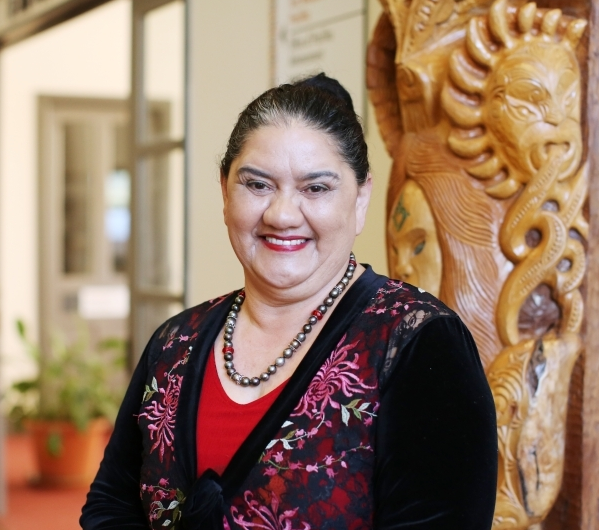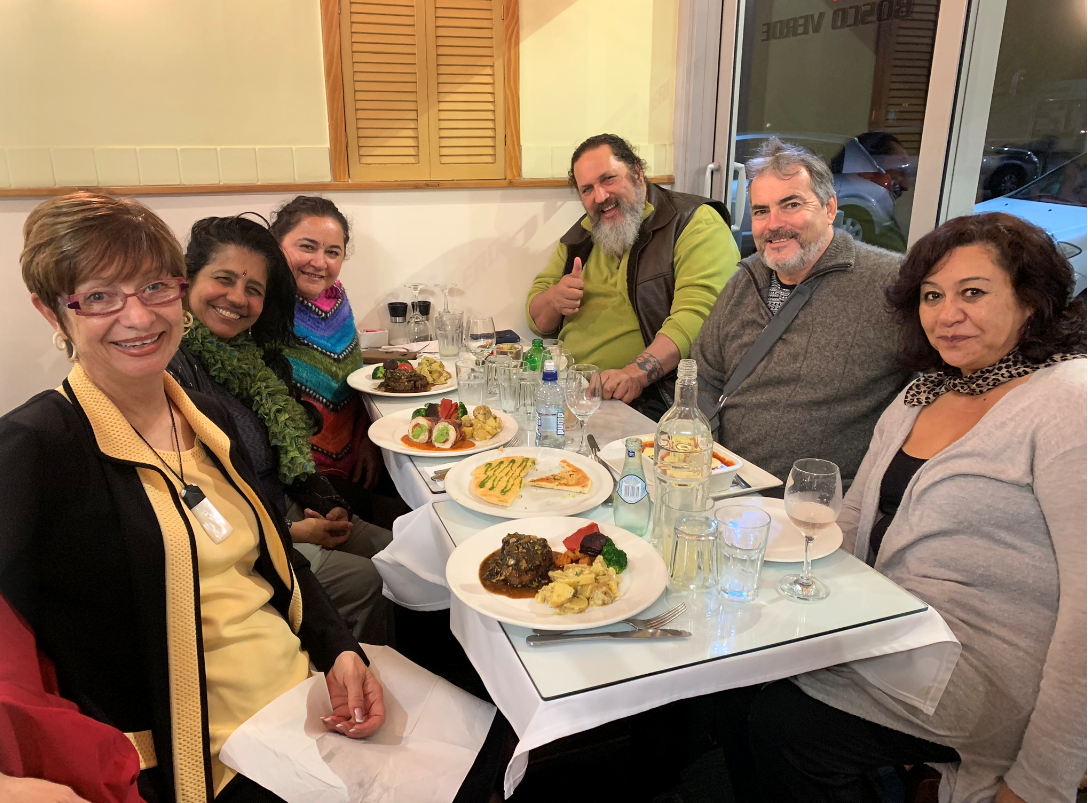Ella Henry and the Stardome Planetarium | Ella Henry y el Planetario Stardome
English
Plans for continuing conversations and presentations required us to move to Auckland, leaving behind Han and Jane’s beautiful cottage, farm, chickens and, most sadly of all, their pigs Rose and Petal. With the use of a supermarket cart we found on the sidewalk, Aparna and I managed to move our belongings to a sterile, high-rise apartment stripped of soul – all white and chrome. The fact that the building was situated across the street from “The Mermaid” – a club that was also “stripped” of soul as well as garments, hardly made matters any better. The city is complicated, parking is an art, and we needed the car to attend our conference back in the Waikato region with our new friend Kyle. The week would provide opportunities for deep learning, including an interview with the amazing Ella Henry (Ngātikahu ki Whangaroa, Ngāti Kuri, Te Rārawa) from Auckland University of Technology (AUT). Ella has a background in Sociology, Māori Studies, Management Studies and Māori Development. Her current research is on understanding the power of indigenous networks and since I am part of the Te Ha Alliance for Indigenous Solidarity (facilitated by the San Francisco-based Cultural Conservancy), we wanted to interview each other. She told me that in her twenties, she had hitch-hiked around the world, and then decided to get a Ph.D. Easy-peasy! Her dissertation focused on Māori entrepreneurship in screen production. She also got a master’s degree on Māori women and leadership. Dr. Henry has been actively involved in the Māori screen industry, serving as Chair of Nga Aho Whakaari, the Association of Māori in Screen Production. She conducts research on, and advocacy for, Māori broadcasting. A humanitarian, she is a leader in the National Science Challenge: Building better homes, towns and cities. We had a great conversation.
Brokered by Sergei Gulyaev, also of the AUT, I was invited to give a talk at the Auckland Stardome Planetarium on June 10th. I worked with Bill Thomas, the President of the Auckland Astronomical Society, to be sure we could use the planetarium for the function it carries out best – showing the night sky. I wanted to demonstrate the heliacal set and rise of Matariki in different latitudes. Matariki shows up “upside down” in the northern hemisphere, compared to how it is seen in New Zealand skies; thus, the planetarium gave the audience the fun experience to view the cluster from different perspectives. A full house audience made me feel welcome and at ease. Kuki and Tania, Rachel and her husband Jim (who rallied to attend after minor surgery earlier in the day), Sergei, and Aparna were all there to support me. After the talk, Sergei thanked me for “bringing wonderful people together.” My Māori friends sang for me. . .
“Te Aroha,” (love)
“Te Hakapono,” (humility)
“Me te Rangimarie,” (peace)
“Tātou Tātou e!” (unity)
On behalf of the Society, Bill gifted me a pair of astronomical binoculars, which would be instrumental in my observations of Matariki later in the month. The night ended at Kuki and Tania’s favorite Italian restaurant nearby.
Español
Los planes para continuar las conversaciones y presentaciones nos obligaron a mudarnos a Auckland, dejando atrás la hermosa cabaña, granja y gallinas de Han y Jane y, lo más triste de todo, sus cerdas Rose y Petal. Con el uso de un carrito de supermercado que encontramos en la acera, Aparna y yo logramos trasladar nuestras pertenencias a un apartamento estéril y de gran altura despojado de espíritu, todo blanco y cromado. El hecho de que el edificio estuviera situado al otro lado de la calle de “The Mermaid”, un club que también estaba “despojado” de su alma, así como de ropa, apenas mejoró las cosas. La ciudad es complicada, el estacionamiento es un arte, y necesitábamos el automóvil para asistir a nuestra conferencia en la región de Waikato con nuestro nuevo amigo Kyle. La semana brindaría oportunidades para el aprendizaje profundo, incluida una entrevista con la increíble Ella Henry (Ngātikahu ki Whangaroa, Ngāti Kuri, Te Rārawa) de la Universidad Tecnológica de Auckland (AUT, por sus siglas en inglés). Ella tiene experiencia en sociología, estudios maoríes, estudios de administración y desarrollo maorí. Su investigación actual es sobre la comprensión del poder de las redes indígenas y dado a que soy parte de la Alianza Te Ha para la Solidaridad Indígena (facilitada por la Conservación Cultural con sede en San Francisco), queríamos entrevistarnos. Ella me dijo que, en su juventud, había hecho autostop alrededor del mundo, y luego decidió obtener un doctorado. ¡Pan comido! Su tésis se centró en el espíritu emprendedor maorí en la producción cinematográfica. También obtuvo una maestría en Estudios de mujeres maoríes y liderazgo. La Dra. Henry ha participado activamente en la industria de la pantalla maorí, presidiendo Nga Aho Whakaari, la Asociación de Maoríes en Producciones Cinematográficas. Realiza investigaciones y aboga por la industria de comunicación maorí. Como humanitaria, es una líder en el “National Science Challenge: Building better homes, towns and cities” [Desafío Nacional de las Ciencias: Construir mejores hogares, pueblos y ciudades]. Tuvimos una estupenda conversación.
A través de los esfuerzos de Sergei Gulyaev, también de la AUT, fui invitada a dar una charla en el Planetario Stardome de Auckland el 10 de junio. Trabajé con Bill Thomas, presidente de la Sociedad Astronómica de Auckland, para asegurarme de que podríamos usar el planetario para la función que mejor realiza: mostrar el cielo nocturno. Quería demostrar la puesta y orto helíacos de Matariki en diferentes latitudes. Matariki aparece “patas arriba” en el hemisferio norte, en comparación con cómo se ve en los cielos de Nueva Zelanda; por consiguiente, el planetario le dio a la audiencia la experiencia divertida de ver el cúmulo desde diferentes perspectivas. Muchísima gente asistió a mi presentación, lo que me hizo sentir bienvenida y a gusto. Kuki y Tania, Rachel y su esposo Jim (quien hizo el esfuerzo de asistir después de una cirugía menor más temprano en el día), Sergei y Aparna estaban allí para apoyarme. Después de la charla, Sergei me agradeció por “reunir a personas maravillosas”. Mis amigos maoríes cantaron para mí…
¡“Te Aroha”, (amor)
“Te Hakapono”, (humildad)
“Me te Rangimarie”, (paz)
“Tātou Tātou e”! (unidad)
En nombre de la Sociedad Astronómica, Bill me regaló un par de binoculares astronómicos, que serían fundamentales en mis observaciones de Matariki a finales de mes. La noche terminó en el restaurante italiano favorito de Kuki y Tania cerca de donde estábamos. ¡Salute!



